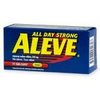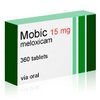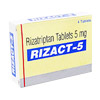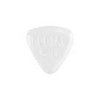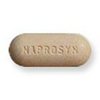INDICATIONS
Aleve (naproxen) is in a group of drugs called nonsteroidal anti-inflammatory drugs (NSAIDs). Naproxen works by reducing hormones that cause inflammation and pain in the body. It commonly used for the reduction of pain, fever, inflammation and stiffness caused by conditions such as:
- osteoarthritis
- kidney stones
- rheumatoid arthritis
- psoriatic arthritis
- gout
- ankylosing spondylitis
- menstrual cramps
- tendinitis
- bursitis
INSTRUCTIONS
Aleve is commonly used for the reduction of pain, fever, inflammation and stiffness caused by conditions such as:
- osteoarthritis
- kidney stones
- rheumatoid arthritis
- psoriatic arthritis
- gout
- ankylosing spondylitis
- menstrual cramps
- tendinitis
- bursitis
INSTRUCTIONS
Take Aleve exactly as directed on the label, or as it has been prescribed by your doctor. Do not use the medication in larger amounts, or use it for longer than recommended. Do not crush, chew, or break an extended-release or enteric-coated tablet. Swallow the pill whole. The extended-release pill is specially made to release medicine slowly in the body. Breaking the pill would cause too much of the drug to be released at one time. The enteric-coated pill has a special coating to protect your stomach. Breaking the pill could damage this coating. Shake the oral suspension (liquid) well just before you measure a dose. To be sure you get the correct dose, measure the liquid with a marked measuring spoon or medicine cup, not with a regular table spoon.
If you take Aleve for a long period of time, your doctor may want to check you on a regular basis to make sure this medication is not causing harmful effects. Do not miss any scheduled visits to your doctor.
Since Aleve is sometimes taken only when needed, you may not be on a dosing schedule. If you are taking the medication regularly, take the missed dose as soon as you remember. If it is almost time for your next dose, skip the missed dose and take the medicine at your next regularly scheduled time.
Do not use any other over-the-counter cold, allergy, or pain medication without first asking your doctor or pharmacist. Many medicines available over the counter contain aspirin or other medicines similar to Aleve (such as ibuprofen or ketoprofen). If you take certain products together you may accidentally take too much of this type of medication. Read the label of any other medicine you are using to see if it contains aspirin, ibuprofen, or ketoprofen. Do not drink alcohol while taking Aleve. Alcohol can increase the risk of stomach bleeding caused by Aleve. Avoid prolonged exposure to sunlight.
Aleve can make your skin more sensitive to sunlight, and a sunburn may result. Wear protective clothing and use sunscreen (SPF 15 or higher) when you are outdoors.
Take Aleve exactly as directed on the label, or as it has been prescribed by your doctor. Do not use the medication in larger amounts, or use it for longer than recommended. Do not crush, chew, or break an extended-release or enteric-coated tablet. Swallow the pill whole. The extended-release pill is specially made to release medicine slowly in the body. Breaking the pill would cause too much of the drug to be released at one time. The enteric-coated pill has a special coating to protect your stomach. Breaking the pill could damage this coating. Shake the oral suspension (liquid) well just before you measure a dose. To be sure you get the correct dose, measure the liquid with a marked measuring spoon or medicine cup, not with a regular table spoon.
If you take Aleve for a long period of time, your doctor may want to check you on a regular basis to make sure this medication is not causing harmful effects. Do not miss any scheduled visits to your doctor.
Since Aleve is sometimes taken only when needed, you may not be on a dosing schedule. If you are taking the medication regularly, take the missed dose as soon as you remember. If it is almost time for your next dose, skip the missed dose and take the medicine at your next regularly scheduled time.
Do not use any other over-the-counter cold, allergy, or pain medication without first asking your doctor or pharmacist. Many medicines available over the counter contain aspirin or other medicines similar to Aleve (such as ibuprofen or ketoprofen). If you take certain products together you may accidentally take too much of this type of medication. Read the label of any other medicine you are using to see if it contains aspirin, ibuprofen, or ketoprofen. Do not drink alcohol while taking Aleve. Alcohol can increase the risk of stomach bleeding caused by Aleve. Avoid prolonged exposure to sunlight.
Aleve can make your skin more sensitive to sunlight, and a sunburn may result. Wear protective clothing and use sunscreen (SPF 15 or higher) when you are outdoors.
STORAGE
Store Aleve at room temperature away from moisture and heat.

